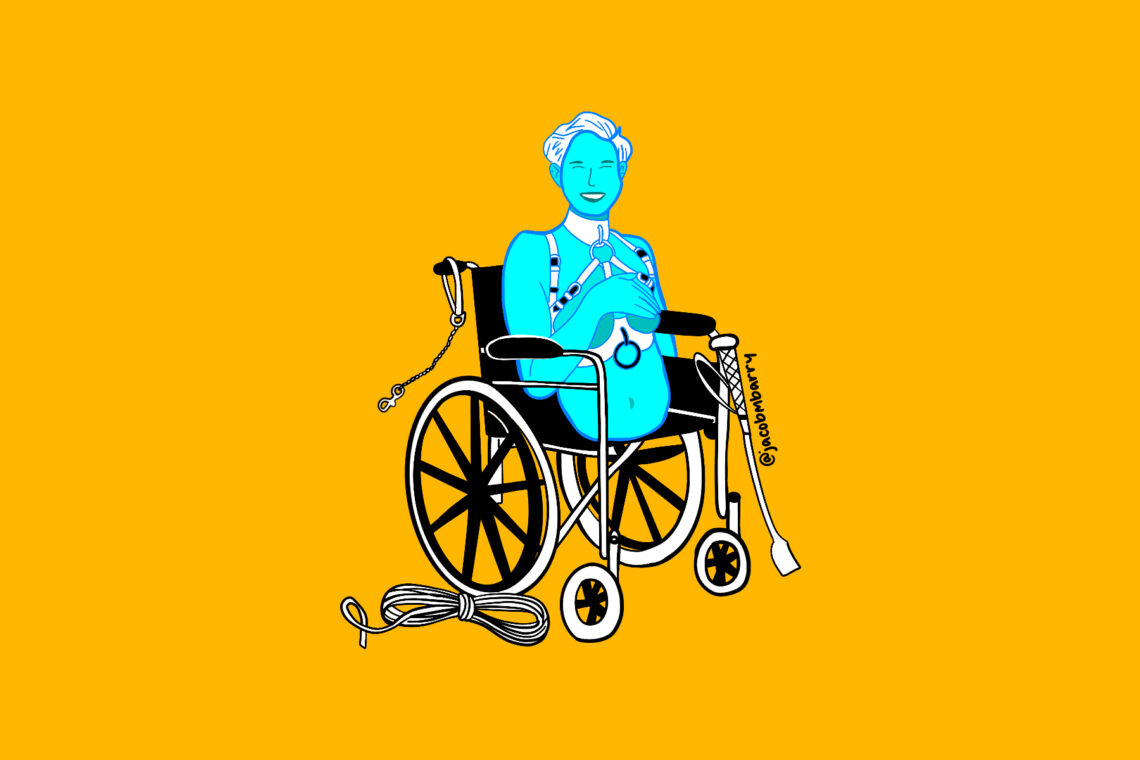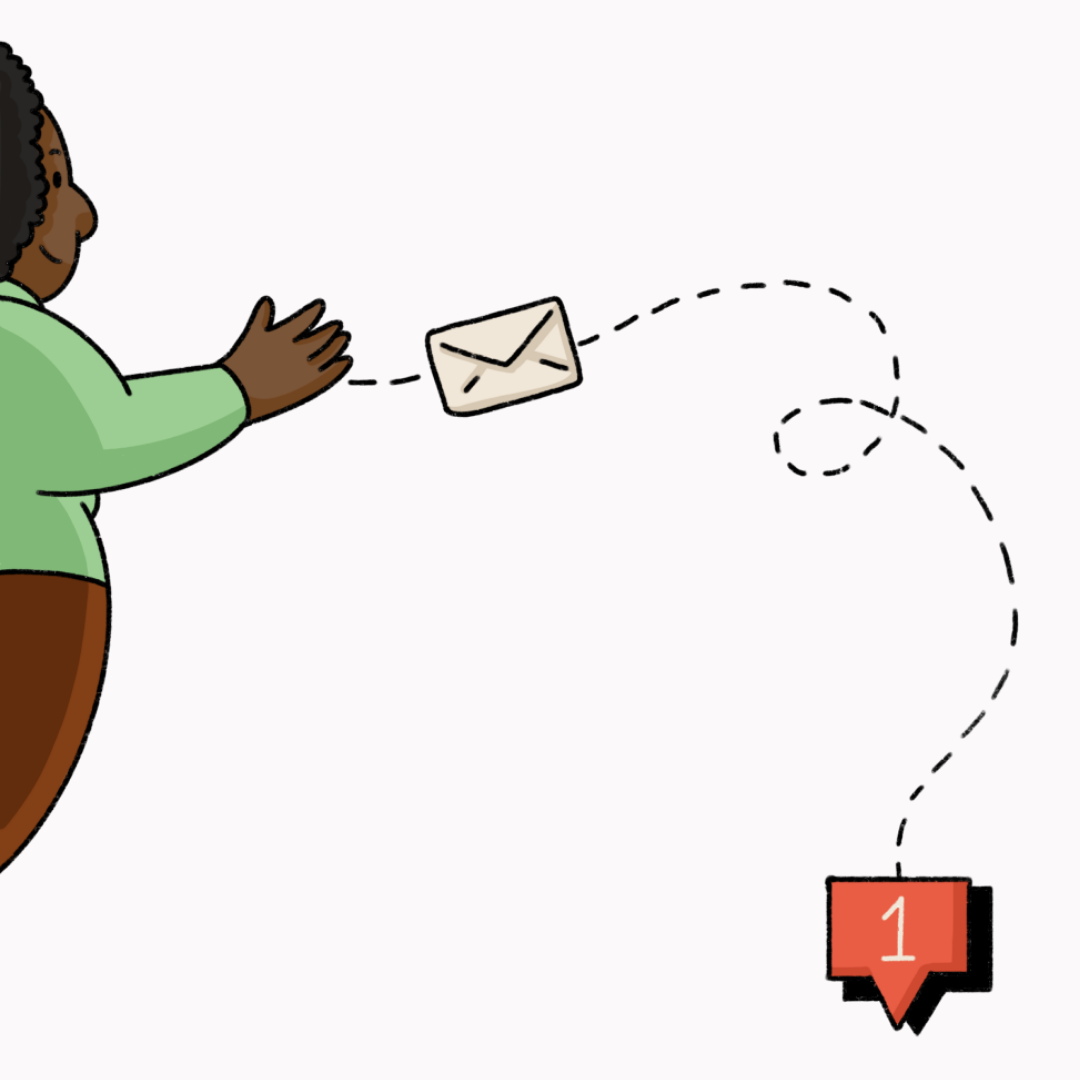Written by: Òla (she/they)
Edited by: Shelby MacGregor (she/her).
*Acronym and term definition key is below the piece
I have a theory that disability breeds ingenuity, and I don’t mean that in some problematic, voyeuristic, Rain Manesque way, or even a “my disabled son is my superhero!” way. I’m referring to the craftiness of those of us having to con our way through survival display on a daily basis. Despite the general consensus that all of us disabled folx are lame and bereft – both literally and physically – we have vibrant lives full of imagination, adventure, love, and yes… sex.
Sex. The blasted three letter word the abled’s decided was all there’s to keep. Sex is natural (even the most fringe groups agree on that), yet every time disabled folx try to make space for ourselves in sex, we are told we are taking up room, and making it too claustrophobic for the people who can have good sex. It makes me laugh because I’ll let you in on a little secret: we are the ones having great sex because like many other things in our lives, we modify it.
The average young adult comes into sexual maturity concerned with their likability, if they’ll be any good at sex, and if that semi regular hook up could be the love of their life. All valid questions that disabled folx like myself asked as well, just with additional questions like: is it worth telling this hookup about the pain? Should I give them the “if I have a TIA or hemiplegic attack we have to stop” conversation? Will my surgical scars turn them off? The first person I had sex with understood that. He was decades my senior, patient and most importantly, enthusiastic to have whatever kind of sex felt good to me. I really lucked out with that one. It’s worth noting that our coupling was problematic for other reasons (such as our 30+ year age gap and his marital status), but sex was not one of them. As I moved further into adulthood, I was met with the harsh reality that he was an exception, not the rule.
Around age 19, I was finding myself exhausted with life, struggling to make friends and maintain relationships, my body was regressing rapidly, and nothing was easy. In my work, I bring a lot of attention to the way we’re taught to internalize sex, how media represents it and who we’re meant to find desirable. I know all the dirty tricks of these White Supremacist, Ableist and Capitalist systems, and yet… I found myself dejected at the thought of a nearly non existent sex life. I spent so much time laboring to survive, to comfort a body constantly aching and a mind always racing, just to be told I couldn’t escape into pleasure.
Who would have thought a little negotiated depravity would get me through the worst of it?
Part of that disabled ingenuity I mentioned earlier has to do with building; whether it be accommodations, actual homes, or community, us disabled folx know the value in crafting space for things that make our lives and relationships easier. Which is why it was no surprise to me that an overwhelming amount of people in my local kink community were disabled as well. My first play party and preceding Munch had more wheelchairs, canes, and other mobility aids than I’d ever seen in one place, and as I grew to know more local kinksters, I realized the majority of us were medically complex, had psychiatric diagnosis and survived indescribable trauma.
We were warriors suited up in crutches and latex!
I’m an old sport at being Disabled. I was born Autistic and at age 17 developed an incurable progressive neurological disease (think brain cancer, without the tumors). Having to navigate conditions of varying complexities isn’t for the weak, and crafting a life that honors all the parts of me can be challenging. My days tend to oscillate between managing one or all of my disabilities – if it’s not this thing, it’s bound to be the other one. Needless to say, a tenacious spirit and inventive mind are necessary to enjoying life in a world you don’t fit the pieces of by design.
The acceptance and community I’d been struggling to find in vanilla facilities and people I found easily in the BDSM community. Not only was I making more genuine connections but I had groups of people who could give me all the tips and tricks on how to maximize BDSM for my disabled needs.
In a lot of ways, BDSM saved me. I’m a sub leaning switch, meaning I play on both sides of the D/s slash but prefer my time subbing. I have a variety of interests in BDSM which include impact play, sadomasochism, exhibitionism, temperature play, voyeurism and a slew of other activities that would make the pope blush. Stepping into that truth opened the doors for more sexual liberation than I could ever ask for.
BDSM is an accommodation and a tool of liberation.
As BDSM becomes more visible and finds itself integrating into the Western lexicon, the conversation quickly becomes reductive and exclusive. This makes a perfect feeding ground for the sanctimonious morality police and the conversation becomes subject to the vitriol of people who rarely know what they’re talking about. (I personally blame Fifty Shades of Grey for this & want it erased from all our memories and media libraries.)
As opposed to asking who benefits from a sexual structure built on principles such as SSC and RACK, people would rather lecture women and femmes about their willing participation in the denigration and sex based violence of their community (as if having vanilla sex is any safer for women & femmes) than examine why consent, negotiation and aftercare aren’t basic tenets of the sex everyone should be having.
BDSM is a tool that we don’t get to talk about enough publicly because ableism would have you believe all disabled folx are asexual hermits or hyper sexual paraphilic deviants. The reality is, getting to control the where and why I receive pain (studies show chronic pain literally alters our brain chemistry; Yang & Chang, 2019) is as important to my health outcomes as any physical therapy or medication.
Sensations don’t discriminate, and realizing my ability to feel deeply all the time, no matter the stimuli, awakened something in me.
I no longer thought only of the ways my body internalized harm but became curious of all it was possible of perceiving. This playful exploration gave me agency where I had none, replaced an area I’d considered “broken” with hope and an adventurer’s spirit.
Belonging to a community of people who understand my perils as well as my victories was essential to developing confidence. That confidence allowed me to make a full time career of sex education and enrich my own sex life. If there’s something ableds could learn from the disabled and kink community, it’s that true self care and love requires sacrifice, that sacrifice being the comfort of what you know to be true. Some days my body doesn’t want to walk or get out of bed or socialize but BDSM allowed me to attach an and to those statements. Some days my body doesn’t want to walk or get out of bed or socialize and it can experience leagues of pleasure, and it bruises very prettily and it can wield a crop with the best of them.
Disability and kink marry at the intersection of truth. They cast a light on all that is unjust in this world through building ladders out of the darkness, the right to exist, the right to pleasure, the right to humanity and the right to personal power. The same power used to become the successful, whole people we’ve always been, armed with the knowledge (and leather) necessary to fall to the altar of life in pride, not shame. What a gift that is.
Terms:
BDSM – Bondage, Dominance/Discipline, Submission/Sadism, and Masochism
Munch – a term for a community meetup in a vanilla setting that is low stakes and meant for connecting and vetting potential partners and/or gaining friends
vanilla – a broad strokes term for non kinky spaces
SSC – safe, sane & consensual
RACK – risk aware consensual kink
D/s – “playing on the slash” is a colloquial phrase for designating whether one plays as a Dom, Sub or Switch.
References:
1. Yang S, Chang MC. Chronic pain: Structural and functional changes in brain structures and associated negative affective states. International Journal of Molecular Sciences. 2019;20(13):3130.



